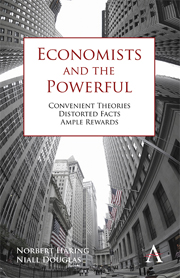Chapter 2 - Money is Power
Published online by Cambridge University Press: 05 February 2013
Summary
An open, competitive, and liberalized financial market can effectively allocate scarce resources in a manner that promotes stability and prosperity far better than governmental intervention.
—Hank Paulson, 2007Market fundamentalism has served well the interests of the owners and the managers of financial capital… Deregulation of financial transactions also served the interests of the managers of financial capital. The financial industry grew to a point there it represented 25 percent of the stock market capitalization of the United States.
—George Soros, 2009Shortly before the subprime crisis, US treasury secretary Hank Paulson insisted that it is best to leave the financial sector alone to do its work. This is not a surprising statement for a former CEO of investment bank Goldman Sachs, whom we would expect to have the interests of the financial industry close to his heart. However, the statement also embodies the prevailing view espoused by textbook economics and economists giving policy advice. According to this view, competition among financial service providers, issuers of securities and investors will ensure that prices of financial instruments reflect their value at all times and that scarce financial resources are allocated to their best uses. It also holds that financial markets tend toward equilibrium and accurately reflect all available information about the future.
The laissez-faire attitude of mainstream economics stands in contrast to popular wisdom. “Money is Power” goes the saying. Those who have a lot of money tend to have commensurate power.
- Type
- Chapter
- Information
- Economists and the PowerfulConvenient Theories, Distorted Facts, Ample Rewards, pp. 47 - 106Publisher: Anthem PressPrint publication year: 2012



